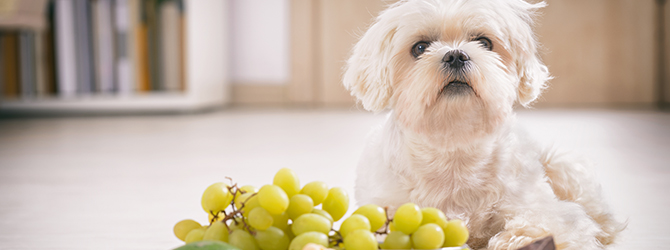Dog Poison: Protecting your Pet from Common Poisons
First Published: 08/10/2018
Last Updated: 24/01/2024
As a dog lover, you want to protect your dog from the hidden dangers that lurk around your home...and the more you know about the plants and substances that are poisonous to dogs and puppies, the better prepared you are to do just that.
We look at the things that can poison your dog, and top tips for keeping your dog or puppy safe.
Antifreeze poisoning in dogs
Antifreeze is particularly toxic to dogs. Containing ethylene glycol, antifreeze poisoning in dogs results in severe symptoms, and even death.
Always store antifreeze in a strong, clearly labelled, sealed container, well out of the reach of your dog. Clean up antifreeze spills immediately – however small – and keep your dog away from the area of the spillage until it’s safe, clean and dry.
If you believe your dog or puppy has come into contact with antifreeze, take them to your local vet immediately – day or night.
Symptoms of antifreeze poisoning in dogs:
- Vomiting
- Lethargy
- Difficulty breathing
- Appearing drunk and uncoordinated
- Seizures
Food, dangerous food...
Many of the foods we love can be poisonous to your dog. Always store the following safely out of reach of your dog or puppy:
- Chocolate – the darker the chocolate, the more toxic to your dog. Always keep chocolate and cocoa stored away safely, including cakes, biscuits and other baked items
- Grapes and raisins – grapes can cause kidney failure if your dog eats them. Raisins are just as bad so take care with fruit cake and other baked goods
- Salt – keep cooking salt and other sources of sodium chloride well out of reach of your dog, including bath salts, dishwasher salt and rock salt
- Alcohol – alcoholic drinks, mouthwash, perfume and aftershave are all dangerous to your dog
- Caffeine – large amounts of caffeine can affect your dog’s heart, so keep coffee, tea and energy drinks safely stored
- Dried fruit – raisins, currants and sultanas all contain toxins that can be fatal to dogs
- Nuts – as well as being a choking hazard, peanuts and macadamia nuts can cause tremors and weakness in your dog
- Xylitol - a sweetener found in chewing gum and some sugar-free peanut butters can be fatal if ingested by your dog
- Moldy food & waste - Can be very harmful to your dog, as they contain tremorgenic mycotoxins. Signs of this type of poisoning include vomiting, tremors and seizures
Symptoms of poisoning in dogs
- Vomiting
- Lethargy
- Difficulty breathing
- Appearing drunk and uncoordinated
- Seizures
If you suspect your dog or puppy has come into contact with a poisonous or toxic substance, call your local vet right away.
Household chemicals that are poisonous to dogs
Cleaning solutions and other household chemicals such as bleach, disinfectant and white spirit need to be locked well out of reach of your dog, safe from probing paws.
The same goes for garden chemicals like insecticides and pesticides – both of which are highly toxic – and other products used to treat garden pests, such as slug pellets, which often contain metaldehyde. Be wary of using rodenticides (used to kill rats, mice, squirrels) in places where your dog could ingest them.
Rodents include not only rats and mice, but also squirrels, woodchucks, chipmunks, porcupines, nutria, and beavers. Although rodents play important roles in nature, they may sometimes require control.
Medications that are toxic to dogs
Many medications that are meant for humans – even those intended for other pets – are poisonous to dogs. Be sure to keep medicines well out of reach of your pet at all times. Paracetamol, anti-inflammatory medications (including ibuprofen), antidepressants and blood pressure medication are among the medicines poisonous to dogs.
Common human painkillers can be very toxic to dogs (and cats) in even very small doses so it’s always best to seek your vet’s advice before giving anything to your pet.
Are lilies poisonous to dogs?
Among all the garden plants that are poisonous to dogs – we’ve listed some below – lilies are particularly toxic.
Dogs can experience severe symptoms from eating any part of the lily plant – including the stem, leaves, petals, stamen and pollen.
Avoid planting any member of the lily family in your garden if you’re a dog owner, and keep cut flowers well out of reach of your pet.
With the risk of lily poisoning in dogs being so high, you may choose not to allow cut lilies into your home. Even if you display them far out of reach, your dog may still chew or swallow fallen petals, leaves and stamen – with disastrous results.
“Dogs are super susceptible to lily poisoning, and can experience severe symptoms from eating any part of the lily plant.”
Which plants are poisonous to dogs?
Many plants are also poisonous to dogs, so take extra care with bunches of cut flowers and houseplants in your home, and when planning your garden planting.
10 plants that are poisonous to dogs
- Lilies
- Daffodils
- Rhododendrons
- Dumb cane (dieffenbachia – a common houseplant)
- Ivy
- Foxgloves
- Mistletoe
- Poinsettia
- Azaleas
- Chrysanthemums
Need advice on poisoning in dogs?
For information and expert advice on common dog poisons, and the best ways to keep them away from your pet, contact your local vet.
Find your nearest vet using our Find a Vet page, or speak to a vet online using Online Vets.
